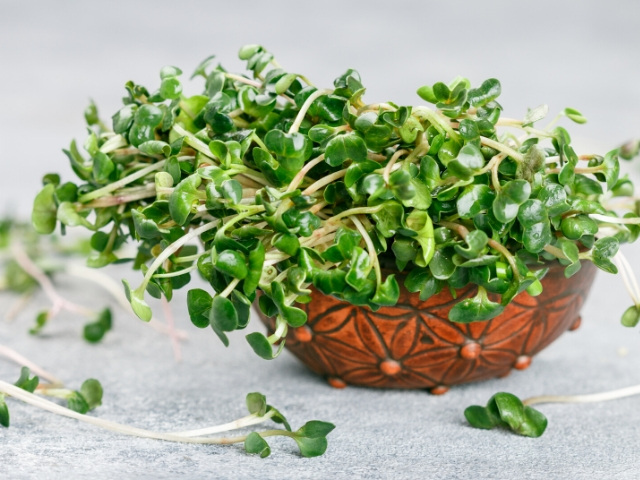Some of the health benefits of Microgreen are Reduced health risks, keeps pigment healthy, increases energy levels, easy digestion, more nutrition and antioxidant rich.
Microgreens are the growing trend now. Many people have now started to add microgreens into everything they eat including sandwiches, smoothies, healthy juices and everything else too. Earlier, green vegetables and green foods were considered very healthy for kids as they contain a lot of iron content and also other essential nutrients like protein, minerals and vitamins. But now microgreens have started to replace these in a more healthier version.
What are microgreens ?
Microgreens are vegetable greens which are harvested from the seedlings of herbs and vegetables. Microgreens arise somewhere between sprouts and baby greens. When the seed starts to grow, it is considered as a sprout which is generally grown in water and harvested in just about 2-3 days. On another hand, microgreens are harvested after 1-3 weeks and require soil, water and sunlight for growth unlike sprouts. The difference between sprouts and microgreens is that sprouts are harvested before the leaves develop. So, sprouts don’t have leaves because they are seeds which are newly germinated while microgreens have leaves. Seeds which are newly germinated. Microgreens are 1-3 inches in size (2.5 – 7.5 cm). [1]
Microgreens carry a wide range of flavor and taste depending on the type of plant. They are often used by chefs in fine dining restaurants due to its great and distinctive texture which enhances the taste of the dishes. Some of the common and well known microgreens are: [2]
- Basil
- Lettuce
- Radish
- Carrot
- Celery
- Broccoli
- Cabbage
- Parsley
- Fennel
- Mint
- Spinach
- Beet
- Kale
- Chives
- Arugula
- Cilantro
- Wheatgrass
- Cucumber
- Rocket
- Mustard
- Garlic
- Amaranth
Microgreens like cucumber which require the summer heat are seasonal while most of the other microgreens are available all around the year and they can also be easily grown at home.
Note: do not confuse the above with baby greens or vegetables. These are the microgreen version of them.
Microgreens: Health Benefits and Growing Tips
Microgreens carry a variety of health benefits and contain a complete package of healthy requirements like nutrients, protein, carbohydrates, good fat (unsaturated), vitamins, nutrients, antioxidants, phytonutrients, polyphenols and minerals. Hence, they give a lot of benefits to the kids and also provide the nutrition they require in their growing age. 7 amazing health benefits of microgreens in your child’s diet are:
Reduced health risks
Microgreens are rich in polyphenols which are antioxidants. These class of antioxidants are known to reduce the risk of heart diseases in future. A research conducted showed that microgreens, especially red cabbage microgreens prevent cholesterol to affect kids from a young age and also lower the probability of getting diagnosed with heart diseases. [3]
Microgreens also prevent the risk of obesity and high blood pressure.
Keeps pigment healthy
Microgreens also have beauty and pigment benefits. They balance the skin pigmentation. Broccoli is very high in vitamin c and a. It also contains glucoraphanin which is converted into a substance called sulforaphane. This gives a healthy glow in the skin by repairing any damages.
Increases energy levels
Microgreens are really rich in iron and calcium content which provide kids with all the energy which is needed in a day. It makes them active throughout which increases their willingness to participate and not feel timid. Clover microgreens contain the most energy providing constituents like magnesium, iron, calcium and zinc. They also provide a longer life expectancy. Microgreens also contain phosphorus and sodium which aid a lot in preventing dehydration and promotes muscle and bone strength apart from increasing the energy levels.
Easy digestion
Children often suffer with indigestion and acidity problems since their digestive system is comparatively weaker in the childhood. Microgreens are rich in enzymes which stimulate the digestive enzymes, hence promoting easy digestion. Full grown food is sometimes hard to digest as it contains enzyme inhibitors, lectins, etc which leads to indigestion. But microgreens don’t contain any of those which keeps the digestion healthy throughout.
More nutrition
As said, microgreens are highly rich in nutrients like potassium, calcium, magnesium, iron, copper and zinc. [5] they also contain more content of nutrients, vitamins and other healthy constituents compared to their respective mature counterparts.
A research was conducted where they assessed the levels of nutrients, minerals, antioxidants, vitamins, etc in lettuce microgreens and mature lettuces to study how the levels differentiate in microgreens and mature counterparts. It was gathered that the levels which were measured in microgreens were 40 times higher compared to the levels of mature ones. [6]
Antioxidant rich
Microgreens are an excellent source of antioxidants prevent many major health issues from occurring like diabetes, infections, cancer, respiratory diseases, arthritis, inflammatory problems, parkinson’s disease, etc. Microgreens also increase immunity of the children.
Out of all the microgreens, Kale microgreens are for anti-cancer and immunity. It is also packed rich with vitamin C. [7]
Unique benefits
Microgreens vary in the nutrition content which they provide. All micronutrients benefit the body in their own specialized way. Some of the benefits respectively to each microgreens are:
| Microgreens | Content | Benefits |
| Arugula | Vitamins – A, K, C
Rich in Calcium |
Strong bones and healthy teeth. |
| Cabbage | Vitamins – A, K, C | Good eye vision and night vision. |
| Broccoli | Vitamins – A, C
Glucoraphanin |
Healthy complexion and natural skin glow. |
| Kale | Vitamin – A, K, C
Omega-3 and Omega-6 |
Blood circulation, healthy hair scalp and strengthens hair roots. |
| Radish | Vitamin – C, A, K
Phosphorus, Zinc, Calcium, Potassium, Folate, Sulphur, Silicon, Omega-3 |
Protects skin from UV rays, prevents thyroid problems, balances weight. |
How to grow Microgreens ?
People today are very busy in a lot of things and it’s also a hard time to manage everything. This is keeping our health at risk due to negligence, ignorance and prioritizing other things in life. The positive thing is that growing microgreens is very easy and convenient because they don’t require a lot of time off your schedule. They can be grown either outdoors or even indoors according to the preference.
Things required
- Quality seeds of the desired plant
- A container
- Soil or homemade compost
- Sunlight for outdoors and UV lighting for indoors (12-16 hours a day)
Process
- Fill up the container with soil and add a little water to it.
- Sprinkle the seeds of your choice on the soil evenly.
- Sprinkle tiny water droplets on the seeds and cover the container with a lid.
- Mist the seeds with water as needed by checking up on them regularly every day. The lid should be closed until the seeds germinate.
- Once the seeds have germinated, remove the lid and start providing light.
- Water everyday and after a week or 10 days, the microgreens will be ready to be harvested.
Finally, microgreens are easy to grow, rich in healthy constituents for kids as well as other age groups, provides fitness and numerous health benefits and are easily added into any diet. There’s no reason to say no to microgreens and a lot of benefits compared to other greens to say yes! Microgreens can be added to a smoothie or juice; used as a topping for soups, pizza and salads; used as a garnish; added in omelette, burger, sandwich, etc. Hence, microgreens are health efficient and very convenient. Healthy Living!













